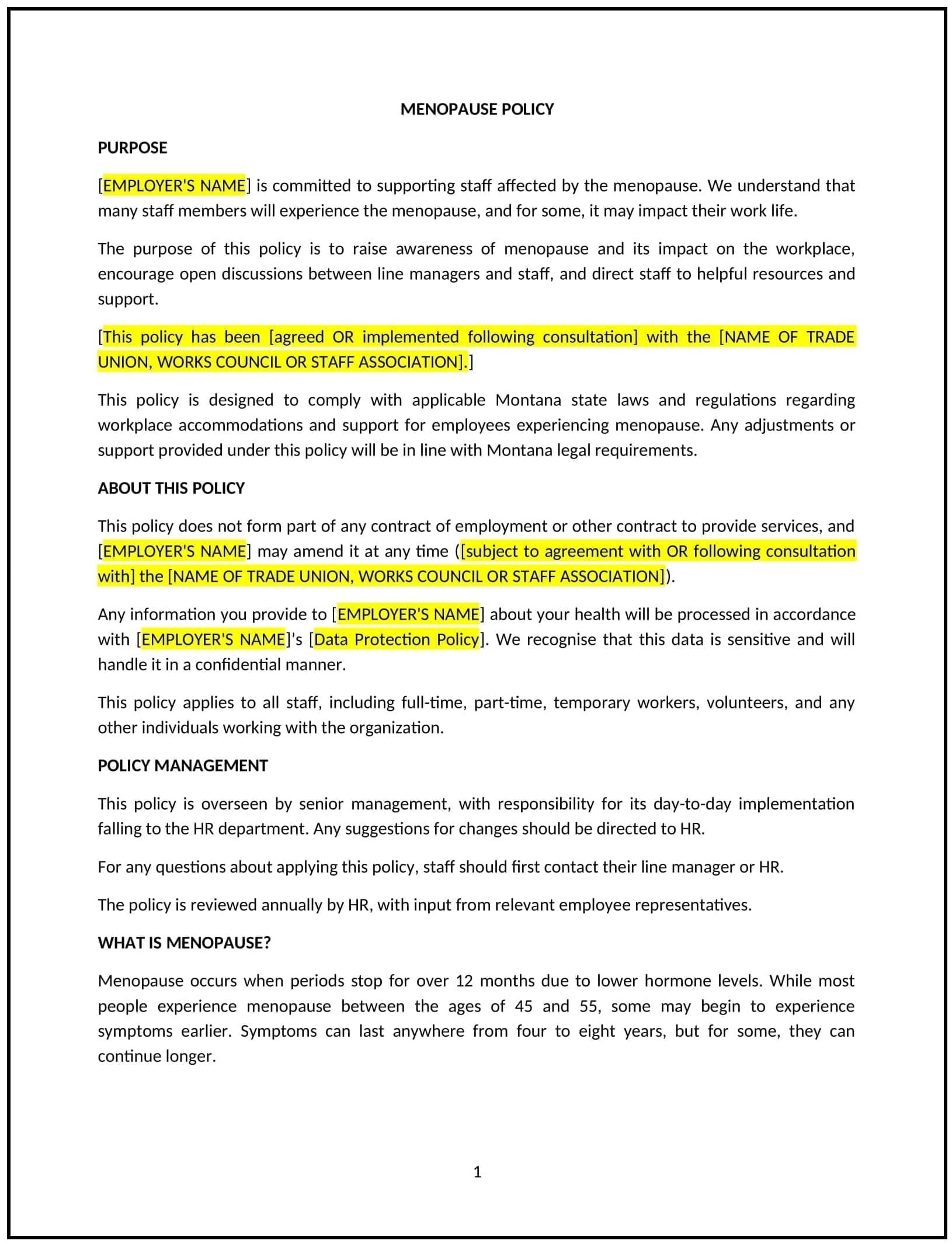Got contracts to review? While you're here for policies, let Cobrief make contract review effortless—start your free review now.

Customize this template for free
Menopause policy (Montana)
A menopause policy helps Montana businesses create a supportive environment for employees experiencing menopause symptoms. This policy outlines how businesses can provide support, address potential challenges in the workplace, and ensure that employees going through menopause are treated fairly and respectfully.
By implementing this policy, businesses can foster an inclusive, supportive workplace, promote employee well-being, and help employees manage menopause symptoms effectively while continuing to contribute to the organization.
How to use this menopause policy (Montana)
- Define menopause and symptoms: The policy should outline what menopause is and the symptoms that employees may experience, such as hot flashes, fatigue, and mood changes. It should emphasize that each employee’s experience is unique and that support should be individualized.
- Offer flexible work arrangements: The policy should include provisions for flexible working hours or remote work to accommodate employees who may need adjustments to their work environment due to menopause symptoms.
- Provide support and accommodations: The policy should specify the types of support available to employees, such as access to quiet spaces, temperature control adjustments, breaks, or the ability to adjust their work schedule if necessary.
- Encourage open communication: The policy should foster a culture where employees feel comfortable discussing their needs with HR or their manager, ensuring confidentiality and respect throughout the process.
- Address health and well-being resources: The policy should inform employees about health and well-being resources, such as counseling, employee assistance programs (EAPs), or access to healthcare professionals who can provide guidance on managing menopause symptoms.
- Set guidelines for training and awareness: The policy should recommend training for managers and HR personnel to raise awareness about menopause, reduce stigma, and equip them to support employees experiencing menopause symptoms effectively.
- Review and update regularly: The policy should be reviewed periodically to ensure it remains aligned with employee needs, legal requirements, and the latest research on menopause and workplace accommodations.
Benefits of using this menopause policy (Montana)
This policy provides several key benefits for Montana businesses:
- Supports employee well-being: By addressing menopause in the workplace, businesses show a commitment to employee health, which can lead to greater employee satisfaction and retention.
- Reduces stigma: The policy helps to reduce the stigma around menopause, encouraging open discussions and creating a supportive environment for employees.
- Enhances productivity: By offering accommodations and support, businesses can help employees manage symptoms effectively, minimizing the impact on their work performance and productivity.
- Promotes inclusivity: A menopause policy demonstrates the company’s commitment to inclusivity, recognizing the needs of employees going through menopause and ensuring they are supported.
- Improves employee engagement: Employees who feel supported are more likely to be engaged, motivated, and loyal to the company, contributing positively to the workplace culture.
- Protects the company’s reputation: Demonstrating a proactive approach to employee health can enhance the company’s reputation as an inclusive and supportive employer.
Tips for using this menopause policy (Montana)
- Communicate the policy clearly: Ensure that all employees are aware of the menopause policy, including the available support and accommodations, and encourage a culture of openness and respect.
- Provide training for managers and HR: Train managers and HR personnel on how to support employees experiencing menopause, including how to handle requests for accommodations and how to discuss the topic sensitively.
- Encourage flexibility in the workplace: Make sure that employees know they can request adjustments to their work schedule, environment, or responsibilities to accommodate menopause symptoms.
- Offer resources and support: Ensure that employees have access to resources such as counseling, healthcare services, or information on managing menopause, so they can make informed decisions about their health and well-being.
- Regularly assess the policy’s effectiveness: Periodically review the policy to ensure it is meeting the needs of employees and to make any necessary updates based on feedback or new research.
- Create a supportive culture: Foster a work environment where menopause is openly discussed, where employees feel comfortable seeking support, and where managers actively listen to and accommodate employee needs.